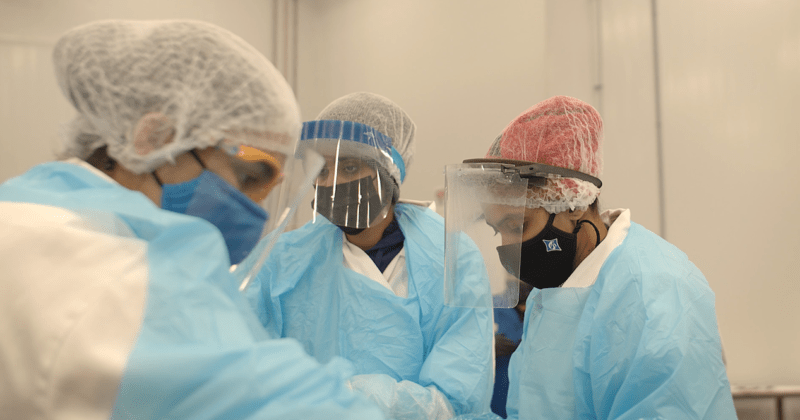BC salmon farm closures will hit Surrey hard
Surrey stands to lose 344 jobs and $220 million in annual revenue with closures of salmon farms in BC’s Discovery Islands, says a new report, which examines the impact of the rural aquaculture industry to an urban community.
By Fabian Dawson
SeaWestNews
The devastating economic fallout triggered by the closures of salmon farms in the remote Discovery Islands will spread to Surrey – BC’s second largest city – killing 344 jobs, says a new economic analysis.
In addition, the city risks losing $220 million in annual revenue, $46 million in GDP and $24 million in annual salaries, said the report, which described Surrey as “the hub of salmon farming in Metro Vancouver.”
“Closing our farms in the Discovery Islands shuts down a quarter of our production in B.C., which significantly reduces how much feed is needed, how many fish will be coming into the processing plants, packaging, the number of trucks needed to transport fish, and shipping. Much of this work is done in Surrey,” said John Paul Fraser, Executive Director of the B.C. Salmon Farmers Association (BCSFA).
The decision to phase out salmon farms in BC’s Discovery Islands was made last December by Federal Fisheries Minister Bernadette Jordan, despite her own scientists saying that the marine operations pose less than a minimal risk to wild fish migrating through the area.
She also ignored her deputy minister’s recommendation for a more coordinated approach to the closures, which was primarily pushed for by anti-fish farm activists, many operating from the Metro Vancouver area.
The fish farmers have applied for a judicial review of the minister’s decision and have already won an injunction allowing them to continue transferring their salmon into the ocean farms pending a Federal Court ruling on the entire planned phase out by June 2022.
Today’s report is the second part of an independent economic impact analysis on the decision, by RIAS Inc., which specialises in helping industries deal with the many challenges that arise from government policy.
The first report released in February found Minister Jordan’s unexpected Discovery Islands’ decision will see BC losing almost $390 million in annual economic output with $87 million less in annual salaries and benefits, and 1,535 fewer jobs mainly in coastal communities.
“This report very likely underestimates the impact of salmon farming in Surrey,” said Doug Blair, a veteran economist and President of RIAS Inc.
“It doesn’t account for the likelihood that the impact in Surrey will be outsized as the salmon farming industry faces a 24 per cent decline in production, it will be forced to consolidate processing operations on Vancouver Island to maintain economies of scale,” he said.
“What is clear, however, is that a substantial number of jobs will be lost in Surrey as salmon farmers attempt to adapt to the impacts of the federal Liberal’s Discovery Islands decision over the next year.”
Blair calculated that the province-wide indirect and induced economic impact generated by Surrey’s salmon farming hub include over $363 million in annual revenues; $122 million in GDP; 1,189 full-time jobs and $65 million in salaries.
Earlier this week, a Department of Fisheries and Oceans’s (DFO) spokesperson told SeaWestNews by email that Minister Jordan has no intention of changing her decision.
Dean Dobrinsky, a spokesperson for Mowi Canada West, which operates most of the salmon farms in the Discovery islands, said the minister’s decision puts at risk the future of the company’s processing plant in Surrey.
“Minister Jordan’s disastrous, ill-informed decision to cancel salmon farming in the Discovery Islands has far reaching implications. Her unsupported decisions have jeopardized the immediate future of the Surrey Processing plant and the hundreds of jobs that support this sustainable sector, B.C.’s largest agricultural export,” he said.
Today’s economic impact analysis hits Surrey, as the city which has a huge South Asian population, celebrates Vaisakhi, the Sikh harvest festival and the Tamil New Year.
A sizeable portion in the Surrey salmon farming hub involves South Asian Canadians working in salmon feed milling, fish processing, trucking, packaging, and the provision of goods and services.
One of them is Nav Nijjer, the owner of Shoreside Workforce, which provides workers for the aquaculture industry.
“This decision happened so fast; it’s already starting to impact my people working in fish processing,” said Nijjer.
“I think the biggest thing for us is the uncertainty that it brings for our Surrey workers…We haven’t been given any information and now my people are left wondering if they’ll have a job in a few months.”
Ravi Jouhal, General Manager, SureCold Refrigerated Storage said he gets questions every day from his team asking about the future.
“I don’t have answers, we don’t know what’s going to happen. I was born and raised here in Surrey and knowing how important the salmon farming sector is to our community makes, this situation that much tougher.”
Farmed Atlantic salmon is BC’s top international food export at $562 million annually playing a key role in the local food supply chain, while supporting about 6,500 full-time, year round jobs in the province.
(Submitted image shows fish processing workers fillet farm-raised salmon in Surrey B.C)

